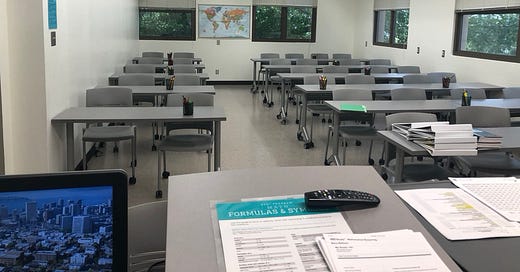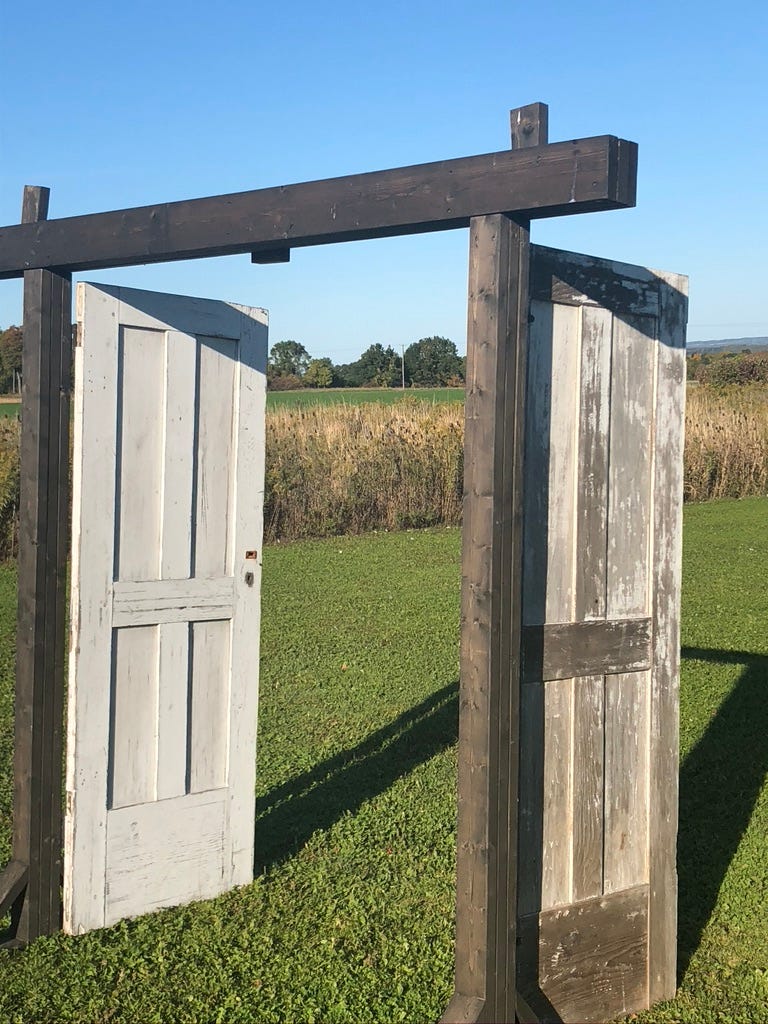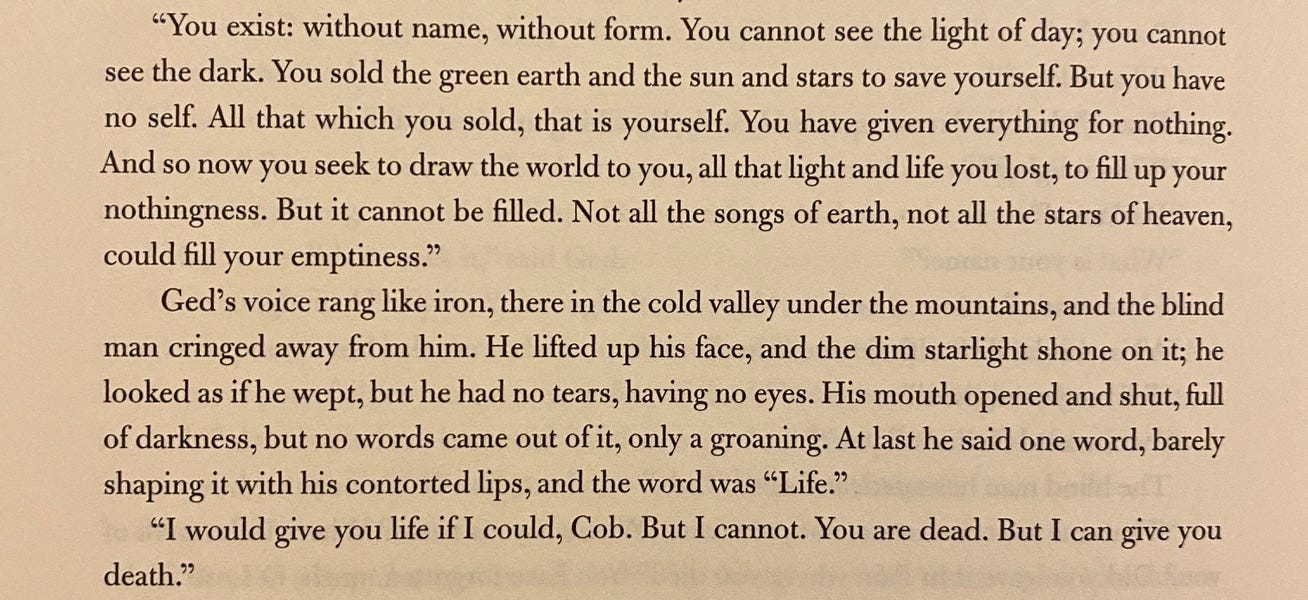You Sold The Green Earth And The Sun And Stars To Save Yourself
You seek to fill up your nothingness, but it cannot be filled
It’s midway through the second week of my college’s winter quarter, a statistic that makes time feel slightly unreal: it was winter quarter of last year when everything came to a screeching halt.
I’m looking ahead at the curriculum I have coming up and realizing it contains the last lessons I taught in person before the pandemic hit. Fond memories, some of them; a week before everything shut down, a friend of mine, then a neuroscience Ph.D. student at the University of Washington, came in to lecture and lead some experiments. There is still a bag of petri dishes containing bacteria we swabbed off of all the classroom surfaces and water fountain stashed under my desk—I found out over a weekend that we couldn’t come back in person, so I never got a chance to tidy up or bring anything home. There’s like a 10% chance that my office is going to look like the pool scene from Annihilation by the time I get back.
By now, the stories of teachers and students struggling to manage the sea change of online-only education are well-trod territory. I haven’t written much about my own virtual teaching struggles and triumphs over the past 10 months, but a recent Seattle Times article about the precipitious dropoff in GED graduates in Washington finally uncorked me, first on Twitter, then here.
Some background: since 2016, I’ve been an instructor at Seattle Central College, teaching in a program specifically geared toward 16-21 year old students who want to earn their GED. In that role I wear a lot of hats—guidance counselor, big brother, anti-capitalist influencer, and so on—but what I get paid to do is getting my students up to graduation level in math, science, language arts, and social studies. To be in my class, the only real prerequisite is that you’ve first dropped out of high school. Accordingly my students enter with a larger set of barriers than your average high school class; in any given quarter, I might have an emancipated minor, two students experiencing homelessness, three with substance use issues or dependencies, and four who received special education services in high school. (Often, all these groups overlap.) We also get our fair share of high achievers whose academic pathways have been derailed by debilitating anxiety, depression, and the like; sprinkle in a few students for whom English is a second or third language and baby, you’ve got a stew going.
These aren’t complaints, mind you; most days, we have a lot of fun together. But I think it’s important to give you a survey of what the population looks like so you can more fully understand the uphill battle they’re facing. Coupled with the data and anecdotes taken from the Seattle Times story, the picture gets…well, you’ll see. Let’s check it out:
While the test took a few months to adapt, it did ultimately launch online — albeit with rules that keep some students out.
Hmm. Alright, not great—but maybe it’s not so bad if we look at some of those rules, society needs rules, after all…
To take the GED, a high school equivalency exam from the testing company Pearson VUE, people need their own ID.
Luckily, everyone in America, even the undocumented, have never had any problems with this condition.
With in-person testing centers largely closed, and state Department of Licensing offices affected by the pandemic, some students wait months after they prep for the exam for their test date — leaving them in danger of forgetting what they’ve studied.
Ah. Nevertheless.
There are strict safeguards: Students are recorded, and an online proctor watches them take the test via the student’s webcam. A student needs a private, walled room with a closed door — a hurdle for students experiencing homelessness or living in cramped spaces.
I think if there’s one thing that we can all agree on, it’s that the demographics most likely to need to take the GED never have any problems with this, either. And certainly the proctors must be extremely professional* people!
*In the past two months I have had multiple students finally get a chance to take their online tests only to be no-showed by the proctors. Can you guess whether or not the GED testing service provides a refund when this happens?
They need…a computer with a webcam, sound and microphone, and consistent Wi-Fi. Students can’t take notes on paper, or eat or drink anything but a glass of water.
Alright man what the fuck. Sorry for cursing. But this seems…excessively draconian. Maybe Orwellian? Or who was that guy with the Panopticon? (These conditions are perfect examples of “cop shit”, a term I borrowed from Jeffrey Moro to talk about this same issue in a previous edition of the newsletter.)
Despite all this, you may find yourself thinking that this is a uniquely sad circumstance that in no way reflects the broader state of things in this country. You would, unfortunately, be incorrect in that assumption. If you’ve read this newsletter even once before—last week’s pie-only issue notwithstanding—you’ve probably discovered that economic inequality is something of a theme around here.
…some note that the Advanced Placement exams — tests that a broad base of affluent families count on for acceleration and college credit — got online faster and more seamlessly than did the GED.
Much in the way that crimes punishable by fines are only crimes if you’re poor, standardized tests that kids from rich families take have not posed nearly as many challenges as the ones that my students do.
A related phenomenon—one of those “it would be funny if it weren’t so serious” things—has been the turn among outspoken conservatives since last Wednesday in demanding that Facebook and Twitter stop banning their most noxious accounts (such as the current president’s) because “corporations shouldn’t have a say in our free speech.” Damn, those people are going to be really upset when they find out about the entire history of the conservative political project. (I also recently saw someone point out that American conservatism is defined by the ethos that “issues don’t matter unless/until they affect me personally,” and boy did they nail it.) It turns out that corporations do exercise an awful lot of control over the lives of average people, whether it’s banning them from Twitter or, you know, getting to control every aspect of what you do for the eight or more hours per day that you’re on the clock working for them.
What this actually all means—a truth which liberals and conservatives alike are only willing to get to the extent that it serves their own self-evident needs—is that there are an awful lot of utilities in this country that need to be nationalized. That is to say, stripped of the profit motive and put under small-d democratic control. (Whether it’s wise to do now in a country with so little commitment to actual democracy is another question entirely.) The need for Facebook and Twitter, for example, to come under public control has been self-evident for some time now; don’t even get me started on Amazon and Google.
I feel the same way about standardized testing. In a perfect America, it would be done away with entirely, but if we have to have it as a means of gauging academic progress, it is absolutely farcical to allow it to remain in the hands of corporations. You can’t read that list of conditions and tell me that Pearson-VUE, the company that owns the GED, isn’t explicitly motivated by the profit generated when students have to take the same test multiple times. We can master the language of the seminar and talk about “equity” and “inclusion” until we’re blue in the face, but micro-targeting in 1,000 different ways in 1,000 different programs across the country will never fix the larger problem: that our educational pathways have been built by vampires intent on squeezing blood from the stone. We have to take public ownership of education—in all its messy, thorny facets—or we’re going to keep building the ranks of the crumbling underclass for the rest of time.
One of my oldest friends, a lifelong libertarian and pre-2016 Republican diehard, texted me yesterday and asked “How did things get to a point where I’m agreeing with you and the far Left?” What I said was: the contradictions of the capitalist project are becoming impossible to ignore, and the conservative obsession with freedom has been exposed for the fraud it’s always been, now that we can all see a little more clearly how desperately unfree so many millions of people are and always have been in this country.
He said: “Yeah.”
Hey one more quick example for you:
Lost in the transition to online: Some accommodations for people with disabilities, who would normally be able to get assistance when taking an in-person test.
In the best of times getting accommodations approved by the GED, even for students with documentation of their disabilities, was a headache; under COVID conditions, it has become a sick joke. In activist parlance I think this phenomenon would be called ableism, but I think it’s more than that: faced with long wait times and uncertainty of getting approved at all, many students who need accommodations end up foregoing them and trying to take the test anyway. As you might imagine that tends not to go well—meaning that either students or their programs are going to be paying for more tests when the students fall below the GED’s “passing” score.
As of press time one such student in my class has been waiting for accommodations approval since October.
It wouldn’t change anything, but I’d still like to scream this passage from Ursula Le Guin’s The Farthest Shore in the faces of the people who built this Byzantine nightmare under which we labor.
Thanks, as always, for reading. And remember: that river will flow on, even after we’re all long gone.
I’ll talk to you next week.
-Chuck
PS - If you liked what you read here, why not subscribe and get this newsletter in your inbox each week? It’s free and always will be.








